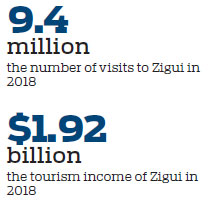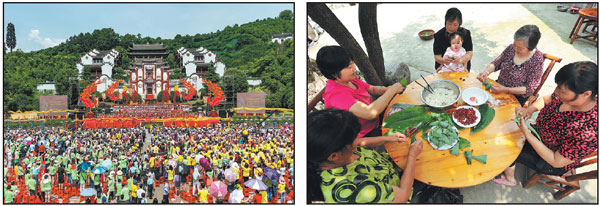Zigui striving to boost tourism potential to fuel development




Zigui could be one of the best places to explore the charm of the Dragon Boat Festival. The county in central Hubei province used to be the hometown of ancient Chinese poet Qu Yuan from the Warring States Period (475-221 BC).
Since people have long celebrated the Dragon Boat Festival to commemorate Qu, Zigui has many folk customs and history related to Qu and the festival.
In the eyes of many locals, the festival has more significance than Chinese New Year.
Zigui's folk customs are one of the four parts of the Chinese Dragon Boat Festival, which was listed as intangible culture heritage by the UNESCO in 2009.
The other three elements are from Hubei's Huangshi; Miluo in Hunan province and Suzhou in Jiangsu province.
For those who have booked trips to Zigui for this year's festival, the local government has arranged 15 major programs featuring intangible culture heritage and gourmet food.

A sacrificial ceremony and zongzi making competition will be staged on June 6 to kick off the celebrations.
About 10,000 people will join the contest to make zongzi - from glutinous rice and reed leaves, according to the Zigui government.
At the same time, a dragon boat race and poetry event will be held.
The goal is to allow more visitors to experience the celebrations, a local government official said.
Zigui's celebrations have been held for hundreds of years and mostly take place along the Yangtze River in local villages, temples and households.
And they are characterized by diverse rituals and distinctive cultural elements.
Typically, people set up altars and worship Qu Yuan. And this involves lighting incense, chanting and paper-burning. The music, costumes and props at the worship ceremony feature elements from the ancient Chu State (1115-223 BC).
Also, as part of the celebrations, red fabric is draped on dragon boats. And boat rowers dress up as Qu's sister and beat drums, while calling his name to ask him to return. People also sing traditional songs after the boats start to move.
Visitors should also not miss the dragon boat race, which is a relatively new addition. It's fun, with rowers competing to reach the finish line.
It's also a sight to see locals recite Xu Yuan's works or exchange poems with each other during the festival.
The celebrations conclude with households inviting relatives and neighbors to dance and sing until sunrise.
The celebrations are part of the local government's efforts to boost tourism and local life.
As of the end of 2018, Zigui had developed five national scenic spots, including the top-rated cultural tourist area of Quyuan's hometown.
And star-rated hotels, homestays and upgraded rural entertainment facilities have also sprung up to cater to travelers.
Zigui received 9.40 million tourist visits in 2018, and tourism income was 13.3 billion yuan ($1.92 billion).
In recent years, a growing number of visitors have been present at the Dragon Boat Festival in the county where they try on ancient clothing from the Warring States Period, and pay respect to Qu Yuan, besides reading related literature at the cultural tourist area in Quyuan's hometown, according to local officials.
The large-scale opera, Our Dragon Boat Festival, has been performed more than 130 times in the area, attracting more than 90,000 viewers.
The rural culture and tourism events featuring local specialities have also helped local farmers increase their incomes.
In a related development, more than 10 million people tuned in to the live broadcasts of the local celebrations on major video streaming sites over the years.
The Zigui government is striving to turn the city into a core tourism zone along the Yangtze River by tapping into its rich culture and ecological resources.
The county was named China's most beautiful filming location at the 74th Venice International Film Festival in 2017. And the goal is to develop a 10-billion-yuan tourism industry to boost Zigui's development.
Contact the writers at yangfeiyue@chinadaily.com.cn
|
People get together in Zigui for the Qu Yuan cultural festival on June 8, 2016. It’s a tradition for the locals to make zongzi during the festival. Zheng Jiayu / For China Daily |
(China Daily Global 06/07/2019 page10)















